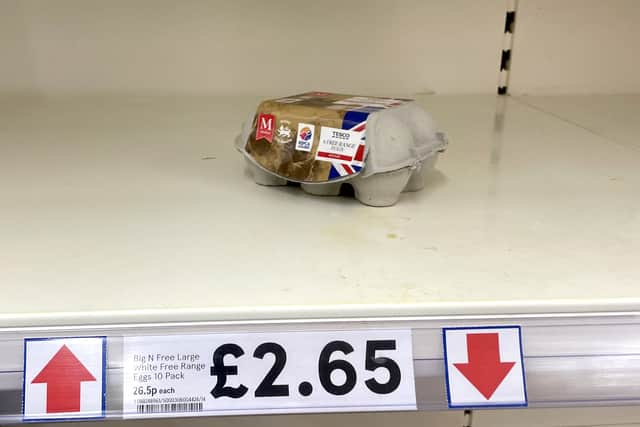Egg shortages to last ‘another year’ as farmers warn production will take time to return to ‘normality
and live on Freeview channel 276
Egg shortages will last for “another year” and production will take time to return to “normality”, a farmer has warned.
The UK has been blighted by nationwide shortages of eggs in recent months due to restrictions to prevent the spread of bird flu
Advertisement
Hide AdAdvertisement
Hide AdSince early November, keepers have been required to house flocks indoors and away from wildlife in a bid to reduce the spread of avian influenza, which led to some supermarkets limiting the number of egg boxes shoppers could buy.
Just last month the government said that eggs labelled “free range” would be back in shops as hens will again have access to outdoor areas. It comes after bird flu risk levels were reduced to “medium”, meaning poultry and other captive birds no longer need to be housed.
But Welsh farmer Llyr Jones said it will take time for the supply of eggs to return to normal, even though stocks have started to be restocked. He told BBC News that a rise in energy bills, coupled with the outbreak of bird flu and the desire for less caged hens have “presented obstacles”.
Mr Jones’ 32,000 hens from the Derwedd Farm in Llanfihangel Glyn Myfyr, Conwy, supply Tesco and produce just over 31,000 eggs per day.


Advertisement
Hide AdAdvertisement
Hide AdHe said supermarkets were reluctant at first to pay farmers more for their eggs, forcing some to quit the industry while others chose not to restock their flocks. This in turn “put pressure on the market and the price of eggs was forced up.”
Farmers who decided not to re-stock are now putting in orders for new hens, but getting them back on farms can take nearly eight months and another two months on top to get them producing eggs.
Mr Jones said “those eggs won’t be on the market for another year” so “just bear with us for a bit”.
The farming union NFU Cymru has warned that egg production "is not a simple switch on, switch off system".
Advertisement
Hide AdAdvertisement
Hide AdRecent Defra figures show egg production has decreased in England and Wales by 2.9% in just three months - to 121 million dozen.
Production is down by nearly a quarter compared to the first three months of last year and it is the lowest amount produced on record for this period according to the figures.
Mr Jones said that a factor adding to the egg shortage was that consumption is growing in the UK by about 3% a year as “eggs are one of the cheapest proteins you can buy” during the cost of living crisis.
He added that as eggs do return to supermarket shelves, shoppers may start to see more white eggs because some farmers have chosen to replace their flocks with white hens - but it won’t make a difference to the quality of taste.
Advertisement
Hide AdAdvertisement
Hide AdIt comes after the UK government on Tuesday (16 May) pledged to put greater emphasis on farmers’ interests in future trade deals.
It added that it would review horticulture and egg supply chains to "ensure farmers get a fair price for their produce".
National Farmers’ Union president Minette Batters welcomed the “very positive” Downing Street food summit, saying it was “timely” as consumers continue to face “enormous” inflation pressures.
The union leader said she had 10 minutes alone with Prime Minister Rishi Sunak and spoke to him about the widescale drop in egg production, the supermarket rationing seen earlier this year of salad ingredients and how to make Britain more self-sufficient.
Advertisement
Hide AdAdvertisement
Hide AdShe said: “I’m really confident that he gets the issue. He is from a very rural constituency, farming is at the heart of his constituency.
“He wants to see this work. I do feel it is very much a change agenda from previous administrations and now we just have to work on delivery and the actions that have been agreed today.
“I think there has to be realisation in government that a lot of the regulation and legislation that we’re facing into is very costly.”
Comment Guidelines
National World encourages reader discussion on our stories. User feedback, insights and back-and-forth exchanges add a rich layer of context to reporting. Please review our Community Guidelines before commenting.
